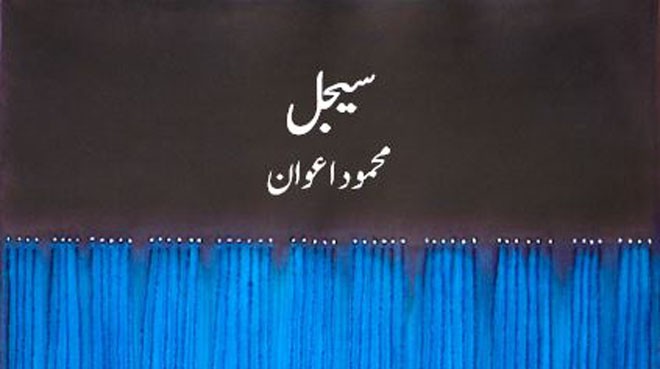
In his latest collection of poems Mahmood Awan captures the zeitgeist of present day Punjab

Mahmood Awan was born in Padhrar, a village in the beautiful valley of Soon Sakesar, and educated in his native village as well as Sargodha and then Lahore. After receiving a degree in Electrical Engineering from UET Lahore in 2000 with an outstanding academic record, Awan spent a few years working in a public telecom organisation and private Telco companies in Lahore.
Then, like many other young, talented people, he left the country and has been living in Dublin, the city of James Joyce, Samuel Beckett and Seamus Heaney, since 2006.
He has now published his third collection of poetry, Sejal (Dampness/wetness), and the most powerful poetry in the book is about the landscape of his village and valley. It is here that his creative power lies, and his poetry comes together like Seamus Heaney’s ‘Personal Helicon’. His poems become the zeitgeist of present day Punjab and embody the crisis the Punjab is experiencing. The rivers are drying up, wells ceasing to exist, trees dying unnatural deaths and birds disappearing into extinction.
The old landscape and people with whom the poet has grown and bloomed are no longer there. When you are in exile, this feeling of withering away, the death of a known world becomes more acute, and this is viscerally felt in his poetry.
It appears that the time we pine for will never return since ‘our time’ is forever gone. These deeply sad poems exacerbate the tragedy of the ever-changing Punjab. It is evident through his language that when the poet thinks about his landscape and people, the memories of his dear ones hunt him.
The clicking of this closing door submerges into a kind of nightmare, but we all know he is not coming back. Time that has passed continues to exist only in poetry and memory.
Another striking feature in his poetry is the image of a loving person, a woman. But, it must be noted that his love poems are not merely love poems, they describe an entire world. While remembering this loving person, he provides details of all the things seen and unseen.
His love poems are sensually material and materially sensual, they are a celebration of body and land. A poet who weaves a similar web is Pablo Neruda.
With this book, Awan has been included in the list of immigrant poets like Amarjit Chandan, Mazhar Tirmazi and Irfan Malik. In his own Punjab, he has become the most indispensable modern poet after Mushtaq Sufi, Abid Ameeq and Raja Sadiqullah.
Modern Punjabi poetry has passed through Marxist, Existentialist, Avant-garde, Absurdist and even Post-Modernist movements, but it is a pity we do not have a single book about modern Punjabi poetry. It appears that we are reluctant to recognise, appreciate and admire new voices. Awan has made his voice known to us by his sheer labour of love, and we all know the labour of love is never lost.
Before reviewing Sejal I also read Awan’s last two publications. His first book of Punjabi poetry Raat Samundar Khed (Let’s Play with the Night Sea) was published in 2002 by Kitab Trinjan, Lahore. He was known amongst the limited Urdu circles even before this book. He was a part of the University of Engineering and Technology (UET) Lahore’s 12 engineers’ collective anthology of ghazals titled Pehli Dhoop (1997) and as the chief coordinator of UET Literary Society, and as secretary of the UET Lyrical Forum, but was a completely new voice in Punjabi then.
Now it is difficult to find a copy of Raat Samundar… Even then, his poetry was not taken much notice of. However, I was struck by the freshness and newness of virgin metaphors and chaste symbols in his first book of poetry. The book was full of angst, and slippery and rugged like the mountains of his native village, Padhrar. It tilted more towards post-modern than modern. Given that he was hardly 25-years-old at that time, anybody who read the book knew that he had all the tools and means to be a good poet.
I can’t resist quoting a few lines:
Unlike his first, his second book of poetry, Veeni Likhia Din (A Day etched on her wrist), won many local poetry awards and was praised by established modern poets. He has also been writing English columns for this publication that discuss modern Punjabi poets and fiction writers and the problems of contemporary Punjabi literature and language. This says a lot about his indefatigable commitment to the language.
He also collected Punjabi folklore on World Wars I and II and his work is instrumental in the post-colonial deconstruction of WWI and the Punjab as part of BBC Radio 4 and Bradford Literature Festival session in 2014-2015.
But all along, Awan knew in his heart of hearts that he needed another book to become a formidable modern Punjabi poet, and he has achieved this with Sejal.
Sejal is a coming of age book of poetry, since it has helped Awan carve a permanent place for himself in modern Punjabi poetry. His poems continue to amaze and enchant Punjabi readers.
Awan has become the new face of modern Punjabi poetry. His slow and gradual journey from his first book of poetry to the present one shows how the angst of a young man converts into a rational protest and meaningful resistance.
In a blurb on Awan’s book cover, Amarjit Chandan, a noted Punjabi poet and essayist says: "Mahmood Awan’s poetry is murraqqa -- mosaic -- of West Punjab’s landscape, history and its language. He is inheritor of our grand masters Peelu and Hafiz Barkhurdar. After travelling across the proverbial seven seas, far away from his homeland Padhrar (Soon Sakesar in Khushab), the ever immigrant Awan’s poetry is his total earning -- a gift to his mother tongue Punjabi."